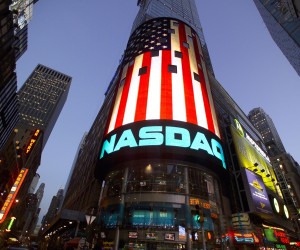
A few comparisons put today's market in perspective.
Though many working on Wall Street have backgrounds in finance or economics, there is certainly a love of history as well. Comparisons to past environments are commonplace, as are predictions based on historical patterns.
There is some value in the study of history; failure to understand the past can lead to sub-optimal decisions in the present. But blind comparisons can be equally foolish; the economic evolution of the past several decades make many direct comparisons challenging.
Below are nine comparisons that illustrate the extent to which both Wall Street and the global economy have evolved.
Facebook > 27 Dow Components
Of the 30 components of the Dow Jones Industrial Average, only Apple, Microsoft, and ExxonMobil are worth more than Facebook, which went public in May 2012.
With a market cap of approximately $275 billion, Facebook is worth nearly as much as five Dow components combined — Travelers (founded 1864), Caterpillar (founded 1925), DuPont (founded 1802), American Express (founded 1850), and United Technologies (founded 1975).
salesforce.com > Largest S&P 500 Company in 1980
In 1980, IBM was the largest company in the S&P 500 with a market cap of about $39.6 billion.
That valuation wouldn’t make the top 100 today, and would fall behind newer technology stocks Adobe Systems ($40 billion), Netflix ($42 billion), and salesforce.com ($46 billion).
Dow’s Intraday Loss (August 24) > Dow’s Entire Value (February 1983)
On August 24, 2015, the Dow dropped as much as 1,089 points, before recovering to close down only 588.
On February 17, 1983 the Dow closed at 1,089.
Atlanta GDP > Greece GDP
The economic output of Greece — a frequent topic of discussion in 2015 — is approximately $242 billion. That would rank 13th among major U.S. metropolitan areas, falling between Miami and Minneapolis.
Data Source: U.S. Department of Commerce
To illustrate both the size of Greece and the potential of emerging markets, consider another comparison: the population of Greece is slightly less than the third-largest city in Pakistan.
Uber Valuation ≈ BlackRock Market Cap
BlackRock, an issuer of mutual funds and iShares ETFs, is the largest asset management company in the world, with about $4.7 trillion under management by 12,400 employees in 30 countries.
The company’s market cap of about $54 billion is roughly equal to privately-held Uber, which recently raised funds at a $51 billion valuation. Other well-known companies that have been surpassed by Uber are shown in the adjacent table.
Uber’s valuation is roughly equal to 25x the valuation of New York Times (NYT) and 5x Harley Davidson (HOG). It’s roughly equal to the combined market cap of the companies shown below:
Black Tuesday Trading Volume < Netflix Trading Volume
On October 29, 1929 — better known as “Black Tuesday” — several records were set on the New York Stock Exchange. One of them related to trading volume: 16,410,030 shares changed hands.
In 2015, the average daily volume for Netflix (NFLX) is about 23 million shares. On October 10, 2008 total volume on the NYSE was 7.34 billion — about 450 times the 1929 high.
Value of NFL Teams > Market Cap of Lima Stock Exchange
Led by a $4 billion valuation for the Dallas Cowboys, the 30 NFL teams are now worth a combined $63 billion. As of August 2015, the market capitalization of the 300 companies listed on the Lima Stock Exchange in Peru totaled $60.5 billion.
The combined value of NBA and MLB teams both exceed the market cap of the Athens Stock Exchange, while the aggregate $15 billion valuation of the 30 NHL teams is slightly less than the market cap of the Budapest Stock Exchange (which has 46 listed companies).
Google R&D ≈ GDP of Madagascar
Google is on pace to spend roughly $11 billion on research and development in 2015. That total is approximately equal to the GDP of the African island of Madagascar, which has a population of about 22 million.
Additional ways to put Google’s R&D expenditures in perspective:
- More than 60 percent of NASA budget;
- 3x Chipotle’s annual revenue;
- 26 percent higher than Chicago’s annual budget;
- Higher than budgets of 16 U.S. states.
GE 2000 Market Cap > GE + MCD + BA + F + TGT 2015 Market Cap
The dot-com bubble is typically thought of as a period of irrational exuberance in tech stocks, but inflated valuations weren’t limited to that sector alone. General Electric reached a peak valuation of $601 billion in August 2000, as Jack Welch was winding down his 20-year tenure as CEO.
Today, GE is worth less than half that amount; in order to reach the $600 billion level, McDonald’s, Boeing, Ford, and Target would need to be added.
Then and Now
While there are certainly lessons to be learned from Wall Street’s history, an understanding of the structural economic changes comes in handy as well. Those who ignore history may be doomed to repeat it, but those who consider nothing besides the past can suffer an equally undesirable fate.
About the Author: Michael Johnston
Michael Johnston is senior analyst for ETF Reference, and also serves as COO of parent company Poseidon Financial. His investment expertise has been featured in The Wall Street Journal, Barron’s, and USA Today, among other publications. He resides in Chicago.


Comments